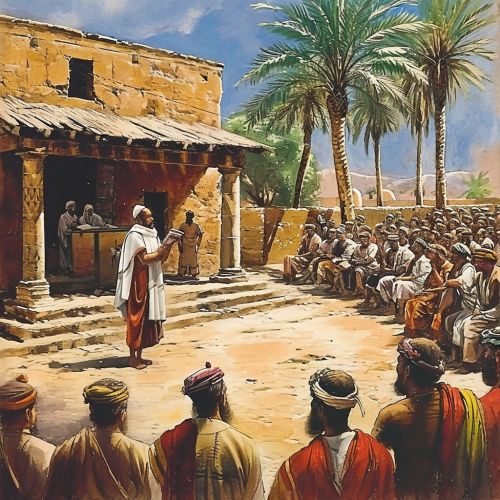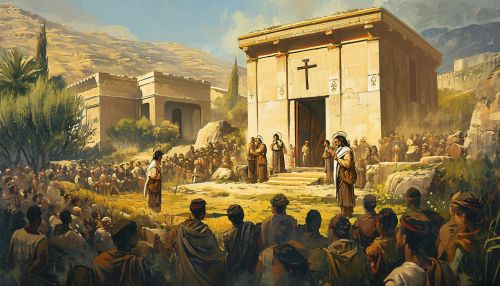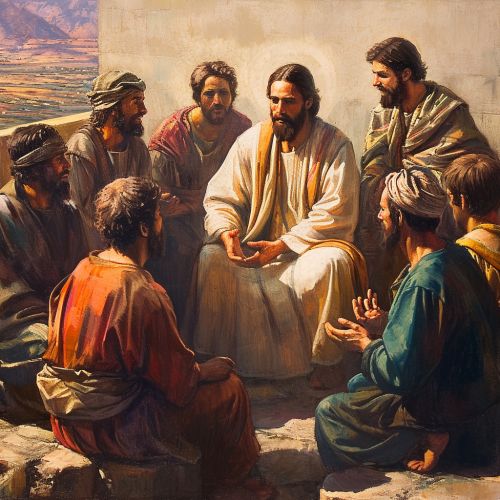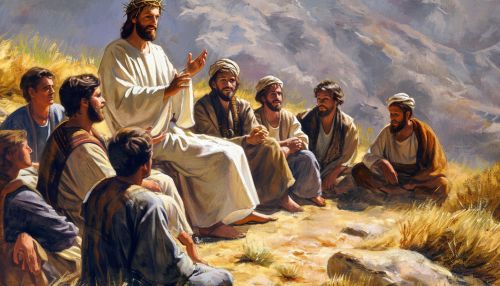Mission (Christianity)
Historical Background
Christian missions have a long and complex history that spans nearly two millennia. The term "mission" in a Christian context refers to the religious work or tasks that Christians undertake to spread the Gospel, or the teachings of Jesus Christ, to those who are not yet believers. This work often involves evangelism, or the proclamation of the Gospel, and discipleship, or the teaching and nurturing of new believers.


In the earliest days of Christianity, the mission was primarily carried out by the Apostles, the original followers of Jesus who were commissioned by him to spread his teachings. This period is often referred to as the Apostolic Age, and it lasted from the Ascension of Jesus around AD 30 until the death of the last Apostle, John, around AD 100.
Following the Apostolic Age, the mission of Christianity continued to spread throughout the Roman Empire and beyond. This period saw the establishment of the first Christian communities in Europe, Africa, and Asia, and the translation of the Bible into various languages.
During the Middle Ages, Christian missions were often tied to the political and military expansion of Christian kingdoms and empires. The Crusades were a notable example of this, as they were both military campaigns and missions to reclaim the Holy Land from Muslim control.
In the modern era, Christian missions have taken on many forms, from the establishment of churches and schools in new territories to the provision of humanitarian aid and social services. Today, Christian missions are carried out by a wide variety of organizations and individuals, from large international agencies to small local churches.
Theology of Mission
The theological basis for Christian missions is found in several key passages of the New Testament. The most famous of these is the Great Commission, a command given by Jesus to his disciples shortly before his Ascension: "Go therefore and make disciples of all nations, baptizing them in the name of the Father and of the Son and of the Holy Spirit, teaching them to observe all that I have commanded you" (Matthew 28:19-20).
This command forms the basis for what is often referred to as the "mission mandate" of the Christian Church. It is seen as a direct command from Jesus to spread his teachings to all people, regardless of their nationality or cultural background.
Other key passages that inform the theology of mission include the Parable of the Sower (Mark 4:1-20), in which Jesus compares the preaching of the Gospel to a farmer sowing seeds, and the Parable of the Great Banquet (Luke 14:15-24), in which Jesus speaks of the Kingdom of God as a feast to which all are invited.


In addition to these biblical passages, the theology of mission is also shaped by various theological and philosophical concepts. One of these is the concept of the Missio Dei, or "Mission of God". This concept, which emerged in the mid-20th century, views mission not primarily as a human activity, but as an activity of God in which humans are invited to participate.
Another important concept is the idea of inculturation, which refers to the adaptation of the Gospel message to different cultural contexts. This idea recognizes that the Gospel is not tied to any one culture or language, but can be expressed in a multitude of ways that are meaningful and relevant to different people groups.
Mission Methods and Strategies
Over the centuries, Christians have employed a wide variety of methods and strategies in their mission work. These have evolved in response to changing cultural, political, and technological contexts, as well as in response to theological and philosophical developments within the Church.
In the early Church, mission work was often carried out by itinerant preachers who traveled from place to place, proclaiming the Gospel and establishing new communities of believers. This method was modeled on the ministry of Jesus and his Apostles, who were themselves itinerant preachers.
During the Middle Ages, mission work was often carried out by monastic orders, such as the Benedictines, the Franciscans, and the Dominicans. These orders established monasteries and schools in new territories, where they provided education and spiritual guidance to the local population.
In the modern era, mission work has often been carried out by specialized mission agencies. These agencies send missionaries to specific regions or people groups, where they engage in a variety of activities, including evangelism, discipleship, humanitarian aid, and social justice work.


In recent decades, there has been a growing emphasis on "holistic mission", which seeks to address not only spiritual needs, but also physical, social, and economic needs. This approach recognizes that the Gospel has implications for all aspects of life, and that mission work should therefore seek to bring about transformation in all these areas.
Another recent trend is the emphasis on "partnership in mission", which seeks to foster collaboration and mutual learning between missionaries and the communities they serve. This approach recognizes that mission is not a one-way process, but a mutual exchange in which both parties have something to contribute and something to learn.
Challenges and Criticisms
Christian missions have faced a number of challenges and criticisms over the centuries. These have come from both within and outside the Church, and they have led to significant changes in the way mission work is understood and carried out.
One of the main criticisms of Christian missions is that they have often been associated with colonialism and cultural imperialism. Critics argue that missionaries have often imposed their own cultural and religious norms on the people they were trying to reach, leading to the destruction of indigenous cultures and religions.
In response to these criticisms, many mission organizations have adopted a more sensitive approach to cultural differences, emphasizing respect for local cultures and traditions, and seeking to present the Gospel in ways that are culturally relevant and respectful.
Another criticism of Christian missions is that they have often focused too much on individual conversion, at the expense of addressing social and economic injustices. In response to this criticism, many mission organizations have adopted a more holistic approach to mission, seeking to address not only spiritual needs, but also physical, social, and economic needs.
Despite these challenges and criticisms, Christian missions continue to play a significant role in the life of the Church and in the world at large. They remain a primary means by which the Christian faith is spread and lived out, and they continue to evolve in response to changing contexts and needs.
